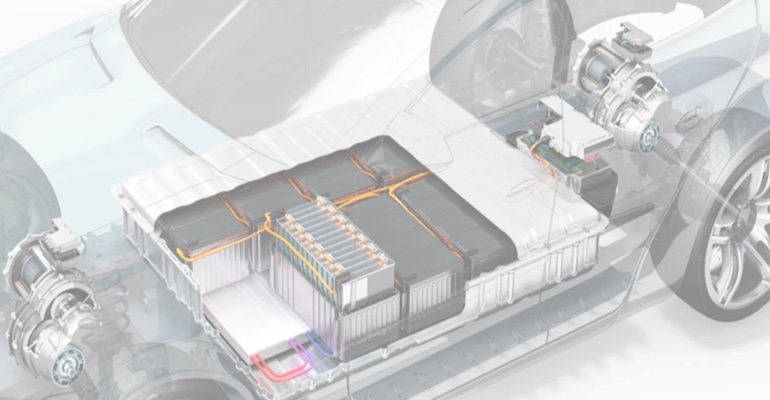Adhesive and Thermal Materials Provide Battery Makers With Peace of Mind
An interview with the Head of Automotive Electronics and E-Mobility, Americas at OEM Supplier Henkel.
October 18, 2021

Jenny McCall, Event Director, Digital Days Expo
Automotive manufacturers invest billions in the design and engineering process for lithium-ion EV batteries to ensure safety and provide peace of mind for consumers. Proactively preventing the catastrophic event of spontaneous combustion can go as deep as the adhesive and thermal materials used that reliably meld components.
One such company helping OEMs produce electric and hybrid vehicles and avoid recalls through their extensive portfolio of Thermal Interface Materials, Adhesives, Sealants, and Functional Coatings is Henkel, a company that will also be an exhibitor at the upcoming Digital Days Expo. The event is a virtual continuation of The Battery Show and Electric & Hybrid Vehicle Technology Expo held in Novi last month that connected more than 550 suppliers with 9,155 buyers and suppliers in attendance.
Slated for November 17-18, the digital event will feature an enhanced conference program with live and on-demand webinars and exhibitor 'booths' spotlighting new products and services.
We sat down with Cristopher Naida, Head of Automotive Electronics and E-Mobility, Americas at Henkel to examine the upcoming event and what attendees can look forward to learning about at their booth.
Jenny McCall: Why is Thermal Management necessary for the EV battery's efficient performance?
Cristopher Naida: Batteries are temperature-sensitive devices that operate well only in a narrow temperature band (typically 10-55C). Above or below that operating temperature range, you can see both efficiency loss and potential reliability or performance issues. The batteries are extremely temperature-sensitive, so the battery pack needs active thermal management systems like liquid-cooled heat exchangers and passive thermal management systems like thermal interface materials (TIMs) and thermally conductive adhesives (TCAs) for efficient and reliable operation.
JM: How are Thermal Interface Materials evolving the EV battery manufacturing process?
CN: Materials are being optimized in three ways. First, their primary function is to transfer heat from batteries to neighboring components efficiently. The material chemistry must be tuned to minimize topographical gaps (i.e., maximize contact between substrates) and provide the optimal thermal conductivity between the cells and cooling plate. Second, due to the large footprint and sheer volume of material used, the dispensing rate and effect on dispensing and supporting manufacturing process need to be understood and optimized not to slow down vehicle or sub-component assembly. Third, more consideration is being given to the battery pack's recyclability, reusability, and repairability when specifying materials. The thermal materials must not only have functional performance. Still, they should be easily removed upon repair/rework and come from sources that do not inhibit downstream recycling or reuse of the battery components for second life or full recycling.
JM: Henkel will be exhibiting at the upcoming Digital Days Expo. What technologies can attendees look forward to seeing and learning about at the company's booth?
CN: Henkel has the broadest portfolio in the industry for electric vehicle solutions. Our technologies include thermal interface materials and thermally conducted adhesives, structural and bonding adhesives, enclosure sealants and gaskets, and electrically conductive and insulative surface coatings.
JM: I understand you are also presenting two webinars at Digital Days Expo. Could you share details and how attendees can tune in?
CN: In addition to our Virtual Booth, we are also presenting two webinars at the conference:
Thermally Conductive Adhesives for Battery Applications – John Timmerman, Principal Scientist at Henkel.
How to increase profitability by optimizing production processes - Fully automatic foam gasket, potting, and gluing applications with Henkel FIPFG technology – Patrick Jeuriens, Business Development Manager - Sonderhoff at Henkel.
To tune in, please register for the event here and search for Henkel in the catalog of educational content available on the platform and add the webinars of interest to your event agenda.
JM: What excites you most about engaging with your community at the upcoming event?
CN: The industry is moving at light speed towards a unified goal of creating an electrified future. It's exciting to be part of a community making this happen and knowing that our contribution towards a sustainable future has a real impact. There are so many challenges to solve to make the electric vehicles of the future a reality, and interfacing with colleagues, industry experts, and customers to collaborate and solve these challenges really helps to energize the team.
To schedule a meeting with Henkel, register for Digital Days Expo here and visit Henkel’s booth in the digital platform to set up a conversation.

You May Also Like



